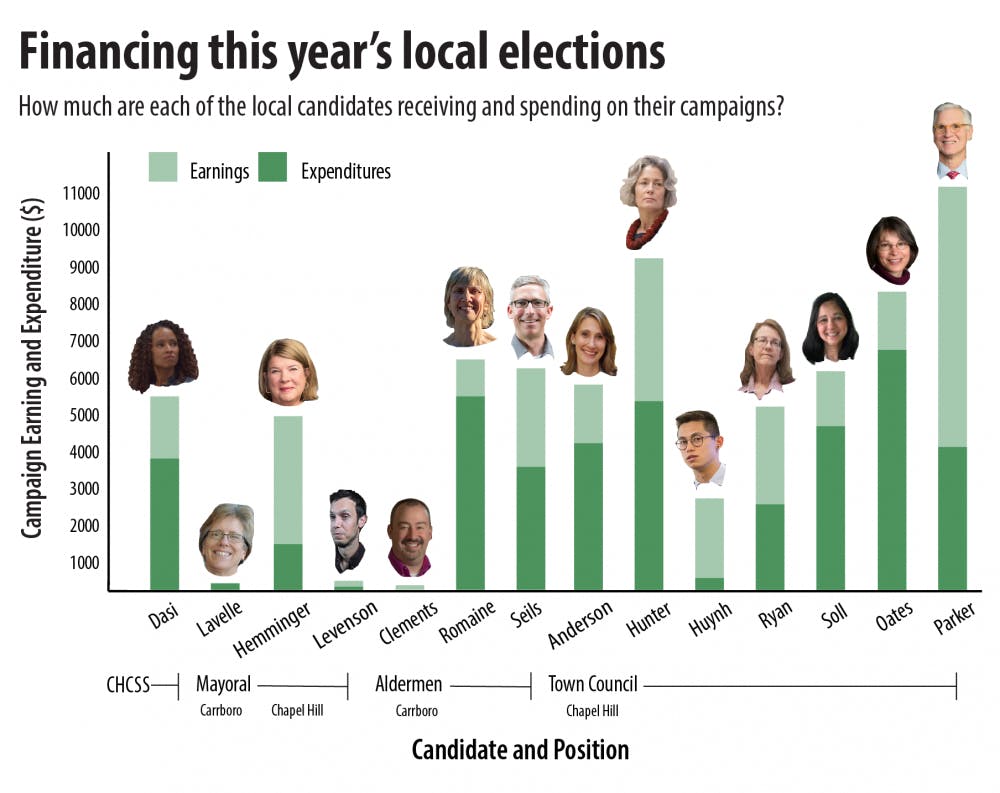“Some state and local campaigns don't cost a lot,” she said. “Others, especially those that rely on television for campaign advertising, end up spending quite a lot.”
Globetti said in Nashville, where she recently lived, she knows a state office candidate that spent close to $100,000 on his race.
What are the laws governing local campaign donations?
The Federal Election Campaign Act has jurisdiction over all federal campaigns, like presidential, House and Senate campaigns, but leaves local election law up to the states.
Every state has a potentially different system from the next, outlining maximum donation amounts or declaring “clean elections,” which can provide a grant to candidates if they promise to follow certain restrictions on spending and private fundraising.
In some states, there is no individual contribution limit. In North Carolina, the limit is $5,400 statewide, though some counties have a lower limit.
In Chapel Hill, the maximum contribution from a single donor is $361, excluding the candidate or their spouse. Individual contributors of more than $37 must be disclosed, and all candidates are required to file reports, no matter the amount spent or collected by the campaign.
In Carrboro, there is a maximum contribution of $250, barring the candidate, spouse, domestic partner, parents, brothers or sisters. Individual contributors of $50 or more must be disclosed, and a report must be filed if the total amount raised exceeds $1,000.
In Hillsborough, Mebane and the CHCCS Board elections, the maximum contribution is $5,400, except for the candidate or spouse. Individuals contributing $50 or more must be disclosed, and a report must be filed if the total amount raised exceeds $1,000.
Who hasn’t submitted a report?
Rachel Raper, director of the Orange County Board of Elections, said in an email all due reports have been posted, except for Louis Tortora, who halted his campaign after allegations of donations to President Donald Trump. This implies those without reports haven’t met the dollar amount threshold requiring them to file.
Candidates for the Carrboro Board of Aldermen Steve Friedman, Matt Neal and Sammy Slade have not submitted reports, as well as candidates for the Chapel Hill-Carrboro City Schools Board of Education Andrew Davidson, Jillian La Serna, Ashton Powell and Deon Temne.
To get the day's news and headlines in your inbox each morning, sign up for our email newsletters.
What are some notable numbers?
Incumbent Carrboro Mayor Lydia Lavelle, now running unopposed, received no contributions and only spent $223.94, compared to 2017 when she received $5,072.00 and spent $1,118.04 to defeat Mike Benson.
The Chapel Hill Town Council candidates — who were all required to file reports, regardless of income or expenditures — on average raised $6,964.56 and spent $4,071.06. The least spent by a town council candidate was $396.89 by Tai Huynh, a UNC student. Incumbent Nancy Oates has spent the most, at $6,869.86.
In 2017, three out of the five town council candidates reported, and raised an average of $10,875.83 and spent $4,840.20.
Andrew Davidson, candidate for the CHCCS Board of Education, did not file a formal report, but promised in a post on Facebook to only spend $999.00 of his own money for his campaign.
Town council candidate Michael Parker was the only candidate to receive over $10,000 in donations, totaling $11,199.01.
Early voting in the county starts Wednesday, but polls in Chapel Hill and Carrboro don't open until Saturday. Residents who aren't registered in Chapel Hill, but want to transfer their registration can do so at one-stop early voting.
city@dailytarheel.com




